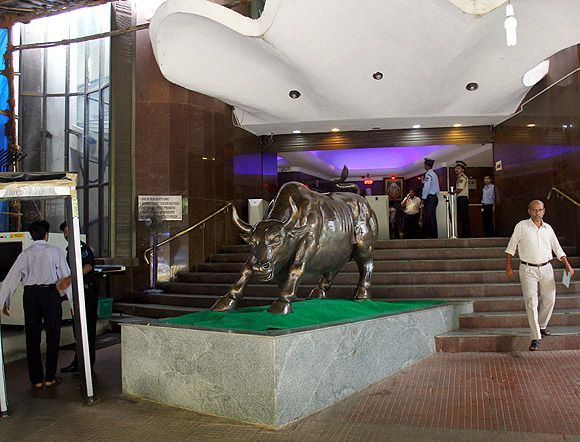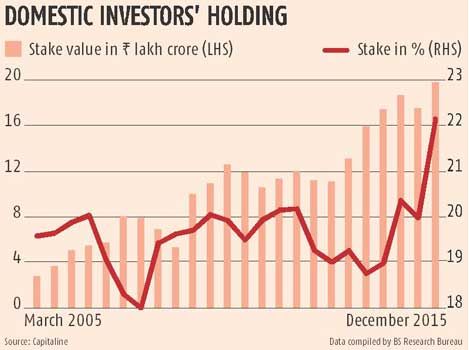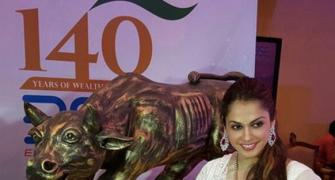 Even as FIIs move out, domestic holding of BSE 500 companies at an all-time high of 22.1% at the end of the December quarter
Even as FIIs move out, domestic holding of BSE 500 companies at an all-time high of 22.1% at the end of the December quarter
Market volatility is yet to dent the confidence of domestic investors.
Equity ownership of domestic institutional and retail (small) investors reached a record high at the end of the December 2015 quarter.
Domestic investors owned 22.1 per cent of BSE 500 companies, worth Rs 19.8 lakh crore (rs 19.8 trillion), at end- December.
Domestic ownership (excluding promoters’ stake) of corporate India was up 210 basis points on a sequential basis in the past quarter.
The previous high was 20.4 per cent at the end of the June quarter. A basis point is one-hundredth of a per cent (see chart).
This was largely driven by individual retail investors.
They made fresh equity investments worth Rs 1.4 lakh crore (Rs 1.4 trillion) during the December quarter. Individual investors now own 10.3 per cent of BSE 500 companies, an ownership level earlier seen during the July-September 2006 quarter.
In domestic insurance companies, mutual funds and retail investors bought fresh shares of BSE 500 companies worth nearly Rs 2.23 lakh crore (Rs 2.23 trillion) in the past quarter.
This more than compensated the sell-off by foreign institutional investors, of shares worth Rs 1.2 lakh crore (Rs 1.2 tillion) in the quarter, resulting in a further decline in their ownership of India’s top listed companies.
FIIs’ ownership of BSE 500 companies declined to 24.1 per cent at end-December from 25.9 per cent at the end of September.
At the peak, foreign investors owned 26 per cent of the companies in the sample.
 At this rate, domestic investors would overtake FIIs to become the largest group of non-promoter investors on Dalal Street, a position they ceded in the September 2013 quarter.
At this rate, domestic investors would overtake FIIs to become the largest group of non-promoter investors on Dalal Street, a position they ceded in the September 2013 quarter.
The analysis is based on the quarter-end market capitalisation and shareholding pattern of 460 BSE 500 companies from the January-March 2005 quarter.
Experts expect the trend to continue in the near term, given the continued investment flows into equity MFs and insurance companies.
“Equity MFs continue to receive fresh inflows, though at a much lower level than in the past.
"This might move equity ownership in favour of domestic investors in the short term,” says Dhananjay Sinha, head institutional equity, Emkay Global Financial Services.
The net inflows into equity MF schemes declined to around Rs 2,000 crore (Rs 20 billion) last month, down from an average of around Rs 8,000 crore (Rs 80 bllion) a month in the past calendar year.
This declining trend is likely to reverse during the ending months of this financial year, as individual tax payers are likely to make fresh investments in tax saving, such as equity linked savings schemes and unit linked insurance plans.
Besides, Life Insurance Corporation is expected to garner a large corpus from its single premium policy, as it does every year.
A part of this corpus is likely to flow into equity, helping the latter’s prices on Dalal Street.
All these might support the market in the near term, even if foreign investors remain bearish.
The long-term trend is, however, uncertain, with a question mark over FII inflow.
Foreign investors have sold India in two of the past three quarters and experts expect inflows to remain volatile in the short term.
“It’s tough to take a call on FII inflow in the short term, given global macro economic volatility.
It could put pressure on the market in the near term but long-term investors remain bullish on India,” says Nitin Jain, president & chief executive, global asset and wealth management, ·Edelweiss Capital.
Historically, FII flows have followed a long-term trajectory linked to changes in the global economy and interest rates.
FIIs were net sellers for nearly three years, between March 2006 and 2009.
Similarly, they were net buyers for nearly four years, between September 2011 and March 2015.
Given this, if FIIs that remain the single largest group of non-promoter investors remain sellers for a long time, domestic investors could be holding the can on the downside.
Image: The Bombay Stock Exchange. Photograph: Hitesh Harisinghani/Rediff.com



.jpg)






